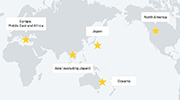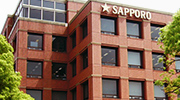Risk Management
Basic Approach to Risk Management
The Sapporo Group defines risks as uncertainties that may affect organizational operations, and we are working to prevent the occurrence of various management risks surrounding the Group. At the same time, we strive to minimize losses by implementing risk countermeasures as appropriate when risks that may have a significant impact on corporate activities materialize. Through these efforts, we are committed to the continued maintenance and development of our business and to securing the trust of society. Furthermore, we appropriately manage and address risks, taking into consideration both threats and opportunities that could have a significant impact on corporate activities.
Risk Management Structure
The Sapporo Group has implemented Enterprise Risk Management (ERM) to enhance the effectiveness of risk management. Toward the realization of the Group Medium- to Long-term Growth Strategy, we strive to ascertain the management risks of the entire Group, identify material risks that may impede the execution of our strategy and the achievement of our management targets, evaluate them in terms of impact and likelihood of occurrence, formulate responsive plans, implement countermeasures, and monitor their progress. With these measures, we have established and are operating an appropriate risk management system, including efforts to mitigate risks.
We have established the Group Risk Management Committee as an advisory body to the Executive Council to centrally manage material risks that could significantly affect the Group’s business activities. This Committee is chaired by Sapporo Holdings President and CEO and consists of risk management officers of Sapporo Holdings and other operating companies engaged in the alcoholic beverage, food and beverage, and real estate businesses, etc. The Committee oversees all risk management activities, including the formulation of Group risk management policies, the collection of risk information, efforts to reduce risks, and the provision of necessary instructions and support to Group companies. In addition, the Subcommittee, a subordinate body of the Committee, promotes efforts to address the material risks of the Group and each company, and monitors their progress in cooperation with the departments in charge of risk management at each operating company. These initiatives and other material risks within the Group are reviewed by the Management Council of Sapporo Holdings and reported to the Board of Directors. Through such reporting, the Board of Directors oversees the effectiveness of risk management.
Furthermore, the Group Risk Management Committee manages risks related to sustainability in cooperation with the Group Sustainability Committee.
*Reference:Corporate governance structure
Group Risk Management Structure

Operational Risks, etc.
Among matters relating to the status of our business and management, the major risks that management recognizes as having the potential to have a significant impact are as described below. We comprehensively evaluate each risk based on internally defined indicators, both quantitatively and qualitatively, to identify risks that have a significant impact for the Group. Their impact and likelihood of occurrence are assessed on a three-level scale of “major,” “medium,” and “minor,” with risk items that are rated “medium” or higher in both aspects being designated as material risks. However, the following is not an extensive list of all risks, and the Group may be affected in the future by risks other than those listed. The matters regarding the material risks for the Group are based on the Group's judgment as of the end of FY2024.
Heat Map of Material Risks for the Group

Responding to Material Risks for the Group
| Category | Item No. | Items | Details of risk | Major initiatives in progress (countermeasures) | Impact | Likelihood of occurrence |
|---|---|---|---|---|---|---|
| Strategic Risks (Note) | ||||||
| 1 | Business portfolio | In the environment surrounding the Group with its core alcoholic beverages business, if the Group is unable to flexibly reconfigure its business, brands, and product portfolio in response to changes in the domestic and international economic climate, society's values toward alcohol, and the market and business environment, the Group may not be able to achieve its business plan. Also, if the Group is unable to realize the synergies it initially anticipated due to the deterioration of the management of a counterparty that it has acquired, partnered with, or collaborated with in order to strengthen its business portfolio, or due to the inability to establish an appropriate governance structure for the organization or business, the Group may not achieve the results it had initially expected. In addition, the Group's performance and financial position may be adversely affected by impairment losses on acquired, partnered, or collaborated businesses due to a decline in their earnings prospects caused by a deterioration in the business environment. |
|
Major | Medium | |
| 2 | Procurement of raw materials, etc. | With respect to the procurement of raw materials, the Group is subject to price increases due to deterioration in market conditions, exchange rate fluctuations, and other factors. In addition, climate change, natural disasters, geopolitical risks, and other factors may affect our manufacturing plans, such as inability to secure the required quantities or delays in delivery. If such situations are prolonged, the Group's performance and financial position may be adversely affected. |
|
Major | Medium | |
| 3 | Securing and developing diverse human resources | The Group has established systems and environments tailored to diverse values and new ways of working, aiming for the success of diverse human resources. However, due to intensifying competition for acquiring human resources in the labor market and lack of training, the Group may not be able to secure sufficient human resources (in management, global, DX/IT, and other areas) identified as necessary for its business strategy. Also, there may be a shortage of human resources due to decreased productivity and increased retirements caused by higher presenteeism and lower employee engagement. In addition, the Group's performance and financial position may be adversely affected by a decrease in profitability resulting from a decline in corporate competitiveness and a deterioration in labor productivity. |
|
Medium | Medium | |
| 4 | R&D | With “good taste” and “health” as the basis, the Group continuously conducts research and development as well as product proposals that can provide value in response to changing consumer needs and lifestyles. However, changes in the business environment due to technological innovation may result in the obsolescence of technologies in which we have strengths in our products and manufacturing processes, and we may lose our competitive advantage. In addition, if unpredictable changes in the business environment occur and the Group's competitiveness in the market declines due to changes in consumer preferences, technological innovations, legal reforms, climate change, or other factors, the Group's performance and financial position may be adversely affected. |
|
Medium | Medium | |
| 5 | Information technology | As a measure to support its growth strategy, the Group is promoting digital transformation (DX) and IT strategies and working to secure and develop highly specialized human resources. However, the inability to fully utilize data and digital technology to promote products may lead to failure to accurately and promptly communicate the appeal of products to customers, thereby losing the opportunity to expand the market share. Also, the inability to properly utilize data and digital technology in business processes may result in failure to improve operational efficiency, which may reduce competitive advantage. In addition, the inability to properly collect and manage valuable data within the Group and effectively utilize it in corporate activities may result in lost opportunities and inefficiencies. |
|
Medium | Major | |
| 6 | Alcohol-related issues | While alcoholic beverages enrich and refresh people's lives, various health problems and social effects due to excessive consumption have been pointed out. With the adoption of the Global Strategy to Reduce the Harmful Use of Alcohol by the World Health Organization (WHO), and the implementation of the Basic Law on Measures to Prevent Damage to Health Due to Alcohol in Japan, it is expected that related regulations will be further strengthened worldwide. In addition, consumer demand for alcoholic beverages has been shrinking in recent years due to people's growing health consciousness and diversifying needs, and as a result, the Group's performance and financial position may be adversely affected. |
* Under 20 years old in Japan (depending on the law in each country) |
Major | Medium | |
| Operational Risks | ||||||
| 7 | Product and service quality | The Group places the highest priority on providing safe and reliable products and services to customers and is strengthening its quality assurance efforts by maintaining mechanisms for quality / food safety management, risk management, and risk communication in relevant divisions and departments of the Group companies, as well as by conducting awareness-raising activities for them. However, in the event of quality or labeling issues related to products or raw materials, a product recall, suspension of shipments, or compensation for damage, etc. may occur. These issues may not only incur costs and take time to resolve but also cause a decline in brand image and a reduction in market share. In addition, if food poisoning occurs at a restaurant or other location in the food service business, the Group may be ordered to suspend operations for a certain period, which may adversely affect the Group's business performance and financial position. |
*1 The Global Food Safety Initiative (GFSI) is an organization whose main objective is to reduce food safety risks throughout the global food supply chain. *2 Hazard Analysis & Critical Control Point (HACCP) is a food standard published by the Codex Alimentarius Commission, a joint agency of the Food and Agriculture Organization of the United Nations (FAO) and the World Health Organization (WHO) |
Medium | Medium | |
| 8 | Information security | In its business activities, the Group uses various systems and handles a great deal of important information. Meanwhile, cyberattacks targeting companies are becoming more sophisticated and elaborate on a daily basis. In the event of falsification of important information, leakage of personal information, or system shutdown, etc., our business activities may be disrupted, which may significantly affect the Group's business performance and financial position. In addition, from the perspective of privacy protection and economic security, personal information protection laws and data protection regulations in various countries have been revised and strengthened in recent years. Accordingly, companies are required to manage information in an increasingly sophisticated manner. |
|
Major | Medium | |
| 9 | Large-scale disasters | In recent years, natural disaster risks such as heavy rains and floods due to climate change, in addition to earthquakes and other risks, have been increasing both domestically and internationally in all regions of the world. In the areas where the Group's business sites are located, such a large-scale natural disaster, pandemic, or other event may cause serious disruptions to the Group's business operations, such as the suspension of business activities due to supply chain disruptions or lifeline shutdowns, or the incurrence of large expenses for the renovation of offices, factories, and other facilities, etc. Also, the recovery of business activities may take a long time. In such cases, the Group's performance and financial position may be severely affected. |
|
Major | Medium | |
| Financial and Tax Risks | ||||||
| 10 | Finance and tax | Although the Group is working to optimize cash flow by reducing funding costs and other means, it may incur losses due to the deterioration of profit/loss from yen conversion due to exchange rate fluctuations, the failure of foreign exchange forward contracts, and changes in interest income and interest expenses due to interest rate fluctuations, as well as changes in the value of financial assets and liabilities. While the Group makes prudent investments considering the business environment and profitability, there is a possibility that the fixed assets held by the Group and goodwill acquired through business combinations may be subject to impairment losses in the future due to a decline in profitability or a fall in market prices. In addition, although the Group is prepared for tax system changes and credit risks of clients and investees, the Group's performance and financial position may be adversely affected if the Group receives findings in an investigation or audit by the tax authorities or if bad debt losses increase due to insufficient credit management. |
|
Medium | Major | |
| ESG Risks | ||||||
| 11 | Environment | The Group is implementing a variety of environmental initiatives, including climate change mitigation measures such as reducing energy consumption and greenhouse gas emissions, reducing and recycling plastic resources, reducing waste and food loss, and conserving water resources. However, further climate change, tighter laws and regulations, and the introduction of new regulations and policies may result in additional costs related to legal compliance and impact on business activities. Also, although the Group is promoting initiatives such as raw material breeding in response to climate change, if it is unable to secure key raw materials or necessary water resources due to future climate change, it may incur opportunity losses due to shutdown of operations. In addition, if environmental pollution or ecosystem destruction caused by our companies results in unplanned expenses, or if the Group fails to fully meet society's expectations as a corporation, leading to a decline in our corporate value, the Group's performance and financial position may be adversely affected. |
|
Major | Medium | |
| 12 | Respect for human rights | With the globalization of corporate activities, society is increasingly concerned about the consideration and efforts of companies toward human rights. Based on the Sapporo Group Human Rights Policy, the Group ensures a work environment that is free from unfair discrimination based on race, ethnicity, nationality, creed, gender, religion, disability, sexual orientation, gender identity, or any other reason. In addition, with the cooperation of our business partners, we are preventing adverse effects on human rights and promoting initiatives to respect human rights. However, if the Group fails to fulfill its responsibility to respect human rights as a corporation, and any actual problems related to human rights violations become apparent, the Group may lose social credibility. As a result, the Group's procurement, production, and sales could be negatively affected, which may force the Group to downsize or withdraw from the business. Moreover, the Group could be subject to fines, lawsuits, or other economic sanctions for violations of laws and regulations, which may lead to a decline in corporate value and adversely affect the Group's performance and financial position. |
|
Major | Medium | |
| 13 | Governance and compliance | Based on the Basic Policy on Corporate Governance, we are working to clarify the supervisory, business execution, and audit functions within the Group under the holding company structure and to strengthen the management oversight function with the aim of improving transparency in management and achieving management targets. In addition, to strengthen governance, we have established the Basic Policy on the Construction of Internal Control Systems and have built and maintained systems and mechanisms to ensure sound corporate management. However, if unforeseen circumstances arise in the future due to changes in the business or external environment, our normal oversight and control activities may become difficult, which may reduce the effectiveness of governance. Reduced effectiveness of governance may lead to compliance risks such as violations of laws and regulations, which may cause economic sanctions such as fines and lawsuits, as well as reputational risks. As a result, the Group's corporate value could decline, which may adversely affect the Group's business performance and financial position. |
|
Medium | Major | |
(Note) The Group recognizes that strategic risks are not stand-alone risks but are interrelated risks.
Risk Management Structure of Overseas Operating Companies
The Sapporo Group Corporate Code of Conduct has been translated into English and efforts are being made to disseminate it fully to all overseas subsidiaries and their affiliated companies.
Additionally, we have built a structure that can take quick and appropriate actions based on the Sapporo Group Crisis Management Rules, if an emergency situation occurs or a fact is discovered that might lead to an emergency situation.
*Reference: From the English version of the Sapporo Group Corporate Code of Conduct (the beginning part excerpted)

Handling of Quality Risks
As part of our mission of a food company, we give highest priority to providing safe products to our customers. We are strengthening our system for eliminating quality risks, by for example providing awareness-raising classes and seminars on risk management and risk communication to all related departments and sections of Group companies.
(1) If a notification or consultation related to a significant food safety or quality assurance issue is received from a customer, employee, or other party, except for insignificant issues, the quality assurance department of the involved operating company discusses corrective measures in its crisis management organization (such as a risk management committee), and after investigating the facts, report the result to the Group Quality Assurance Department, and to the Group Risk Management Committee (hereinafter GRM Committee) Secretariat.
(2) For quality assurance issues related to food safety, it is extremely important to respond promptly and appropriately at the early stage of occurrence and to quickly disseminate the information horizontally within the Group. Therefore, if there is a suspicion of a serious incident, the quality assurance department of the operating company, in cooperation with its own risk department, shall promptly report the matter directly to the Group Quality Assurance Department and GRM Committee Secretariat without going through its crisis management organization.
In that case, the GRM Committee Secretariat, which receives the report, swiftly briefs to the GRM Committee chairperson or acting chairperson, full-time members of the Audit & Supervisory Board, and other GRM Committee members. The Group Quality Assurance Department grasps the status of activities of the operating company concerned and provides support to all Group companies to ensure that the value of each brand is not damaged.
Handling of Information Leak Risks
In accordance with the Sapporo Group Corporate Code of Conduct, the Sapporo Group is carrying out proper and secure management of its trade secrets, which are the Group’s assets.
Trade Secret Management Promotion Structure
To oversee and promote the trade secret management activities of the entire Sapporo Group, we are planning to set up the Group Information Protection Committee. We will also set up a promotion secretariat at each operating company in order to promote cross-departmental trade secret management.
Handling of Accidents and Violations
If an accident or violation related to trade secret management occurs, the Sapporo Group will call a meeting of the Group Risk Management Committee and take appropriate actions, with priority given to customer protection and social responsibility
Trade Secret Management
The Sapporo Group considers trade secret management one of its business management tasks, and assesses its trade secrets to properly manage them. We also carry out employee education, as well as management activities such as handling of information security accidents or violations, in order to solidly establish information security management for trade secrets within our organization.
Safety Management of Physical Environment
We have established necessary management requirements, such as crime/disaster-prevention measures and access management/monitoring, for our buildings, offices, and other facilities, in order to ensure the safety of these facilities.
Security Management of Information Systems
To reliably protect and effectively utilize our digitized trade secrets, we have established security management requirements for information systems, including restricting access to electronic data and files, encryption of electronic data and files, and collection and monitoring of access history, as well as countermeasures against malicious programs, in order to ensure the security of our information systems.
Education
The Sapporo Group is continuing to provide education to ensure that everyone in the Group thoroughly understands our internal rules and knows how to handle and manage trade secrets.
Continuous Improvement
As part of continuous business management activities, we ensure that trade secret management is being reliably executed and that necessary improvements are being made.
Countermeasures Assuming Large-scale Disasters
The Sapporo Group has established the “Severe Disaster Response Rules”, specifying the basic policies we must follow and providing an overview of disaster countermeasures, and is continuously working on formulating a business continuity plan (BCP) in preparation for the occurrence of a severe disaster.
-
Group Disaster Response Headquarters: The following matters are addressed as an initial response to a disaster.
① Confirm the safety of Group employees and grasp the damage situation.
② Grasp the extent of damage of Group sites and buildings.
③ Share the information of ① and ② within the Group.
Group companies will make judgments as to whether or not to activate the BCP, and we will disclose the status of the BCP to the public as needed. - Group Risk Management Committee: After grasping the extent of damage caused by the disaster, the committee decides whether or not to activate the Group BCP and provides support in case Group companies activate their own BCP.
※ Severe disasters: Earthquakes with an intensity of at least 6 occurring in Japan and accompanying tsunamis. Alternatively, the disasters designated by the Director of the Group Disaster Response Headquarters.
Note that the formulated BCP is revised appropriately if necessary, based on the actions when a disaster occurs and the subsequent verifications.
1. Activities within the Group
①Maintenance of disaster prevention stockpiles
We maintain a stockpile of disaster reserves necessary for life during disasters, such as emergency food and portable toilets, at all Group sites, and advance efforts in accordance with the policies of each local governments and the business operations of our companies in the event of a disaster.
②Grasping and sharing information on the safety of Group employees and the damage situation (their family members and houses)
We share the information promptly using the Group's standard emergency contact and safety confirmation system (“Emergency Call” provided by Infocom Corporation).
③Grasping and sharing information on the damage situation of buildings and facilities at Group sites
We use a building status reporting system (“BCPortal” provided by Infocom Corporation) for the group to consolidate and share information on the damage situation of all group companies by having each site input its damage situation for buildings and facilities on the Web.
During normal times, training for entering data into both systems is carried out regularly so that we can take quick action in the event of a severe disaster, and we are also reviewing our operations.
2. Activities within communities
Sapporo Real Estate, which operates and manages Yebisu Garden Place, has a written agreement with Shibuya Ward for supporting people who are unable to go home during a disaster. Based on this agreement, a system is in place to accept people who have difficulty returning home at the Yebisu Garden Place site in the event of a large-scale earthquake, and in cooperation with Shibuya Ward, regular drills are held to accept people, including companies in the Yebisu area.
Other companies within the Group are also taking steps to contribute to society and their local communities, for example concluding written agreements with local governments, covering supply of goods following a disaster.
Taking into consideration their respective business characteristics, the Sapporo Group’s operating companies (Sapporo Breweries, POKKA SAPPORO Food & Beverage, Sapporo Lion, and Sapporo Real Estate ) are continually engaged in the formulation and modification of BCP.
Three basic policies related to severe disasters (from the Group’s Severe Disaster Response Rules)

Group’s common emergency employee contact and safety confirmation system (Emergency Call)

Building status reporting system for bases (BCPortal)

Handling of Social Networking Services (SNS)
The Sapporo Group recognizes that if an employee posts an inappropriate comment on SNS or other online platforms, or if a company discloses information or responds inappropriately to a customer, its bad reputation can rapidly expand online, resulting in a serious loss of trust from our stakeholders. Therefore, the Group educates its employees on personal use of SNS and has built a structure to monitor information on the web and take other appropriate actions.
- Education of Group employees
We are trying to ensure that our employees adhere to the following rules when using an SNS:
(1) Only deal with public information
(2) Post comments or submit information at your own responsibility.
(3) Post comments that are transparent and do not post comments that could be perceived as slandering by other companies or people.
(4) Respect your own and others’ privacy.
(5) Do not use SNS for personal matters during working hours. - SNS monitoring structure
We have established a structure capable of monitoring SNS in the General Affairs Department of Sapporo Holdings and are monitoring the content of Group-related information posted on SNS.
We also use an outside contractor to conduct monitoring during weeknights and weekends. A structure has been built to ensure that information is promptly shared among relevant departments and personnel and that appropriate countermeasures can be taken in the event that Group-related information is spread or goes viral outside of working hours.



















